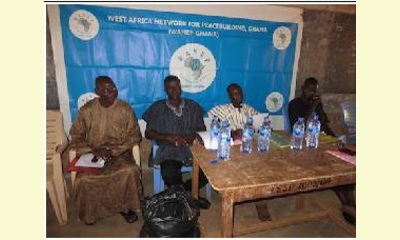|
|
Ghana: WANEP trains 150 peace Ambassadors in Tamale Schools
un articulo por Ghana Web (abridged)
The West Africa Network for Peace Building
(WANEP-Ghana) has recruited 150 pupils drawn
from 10 selected schools in the Tamale Metro for
training as peace Ambassadors. 
click on photo to enlarge
The organization in partnership with the Ghana
Education Service (GES), Parent Teacher
Associations (PTA) and School Management
Committees has formed peace clubs in the 10
selected schools beginning with 15 members
each.
This is in line with WANEP-Ghana’s newly
launched programme on the theme, “The role of
children in promoting a culture of peace in
Ghana.”
The programme which will be piloted for one year
was officially launched at the Tamale Evangelical
Presbyterian Junior School where the first peace
club was formed.
WANEP-Ghana’s national Coordinator, Issac
Bayor exclusively told Citi News the programme
was meant to bridge the generational gap in the
organization’s conflict resolution and peace
management mechanisms.
He said WANEP-Ghana reviewed its performance
and realized that it overly concentrated on the
adult population, hence the paradigm shift to the
younger generation.
“When we talk about peace, is not a one man
show but a matter which should be tackled
holistically: when we talk about peace we usually
concentrate on the adults, the front runners, the
combatants and chiefs and we usually ignore the
little ones who are actually are the people who
grow up to engage in this violence acts,”
Issac Bayor said WANEP-Ghana estimated that
children and women formed majority of victims in
conflict situations and there was the need to
groom basic school pupils to serve as
Ambassadors of peace in their localities.
“For us at the West Africa Network for Peace
Building, we think it is important that we tackle the
issue right from the grassroots, at the basic level
and inculcate the culture of peace, culture of non
violence, culture of diversity that will ensure that
these people behave in a way and cultivate the
attitude that is enduring so that when they grow
up they will be able to understand what they need
to do so that peace will prevail in our
communities.”
Some of the EP JHS peace club members
commended WANEP-Ghana for the initiative and
pledged their commitment to replicate the
orientation on their peers.
A senior officer at the Tamale Metro Education
Directorate, Ishak Abdul Latif who launched the
programme regretted that the recurring conflict
situation in the region always affected the
academic calendar.
“Where we are operating from in the Northern
Region, Tamale in particular, we have had
incidents of the youth involving in violence
activities and as a directorate we have always
seen that if we are able to train our children in the
schools to take up peace and mediation initiatives
within the schools and in our communities it will
go a long way to curb violence activities in future.”
Ishak Abdul Latif said the GES will deepen its
collaboration with WANEP-Ghana to make the
programme a success by replicating it in all
schools in the Tamale Metro Area. . .
|








|
DISCUSSION
Pregunta(s) relacionada(s) al artículo :
Peace Studies in School Curricula, What would it take to make it happen around the world?
* * * * *
Comentario más reciente:
:
During the Asian Educators Symposium, we found out that Peace Education is still not part of the school curriculum in most countries. However, the participating teachers have been incorporating peace education in their teaching subjects, such as English, social studies, and character education. We all agreed that love and the will to nurture peace in children are the most important basis for peace education. Even if peace education is not a part of the curriculum, peace can be taught through any subject. Whatever you are teaching, if it comes from the heart, then it will touch the minds of children.

|
|









